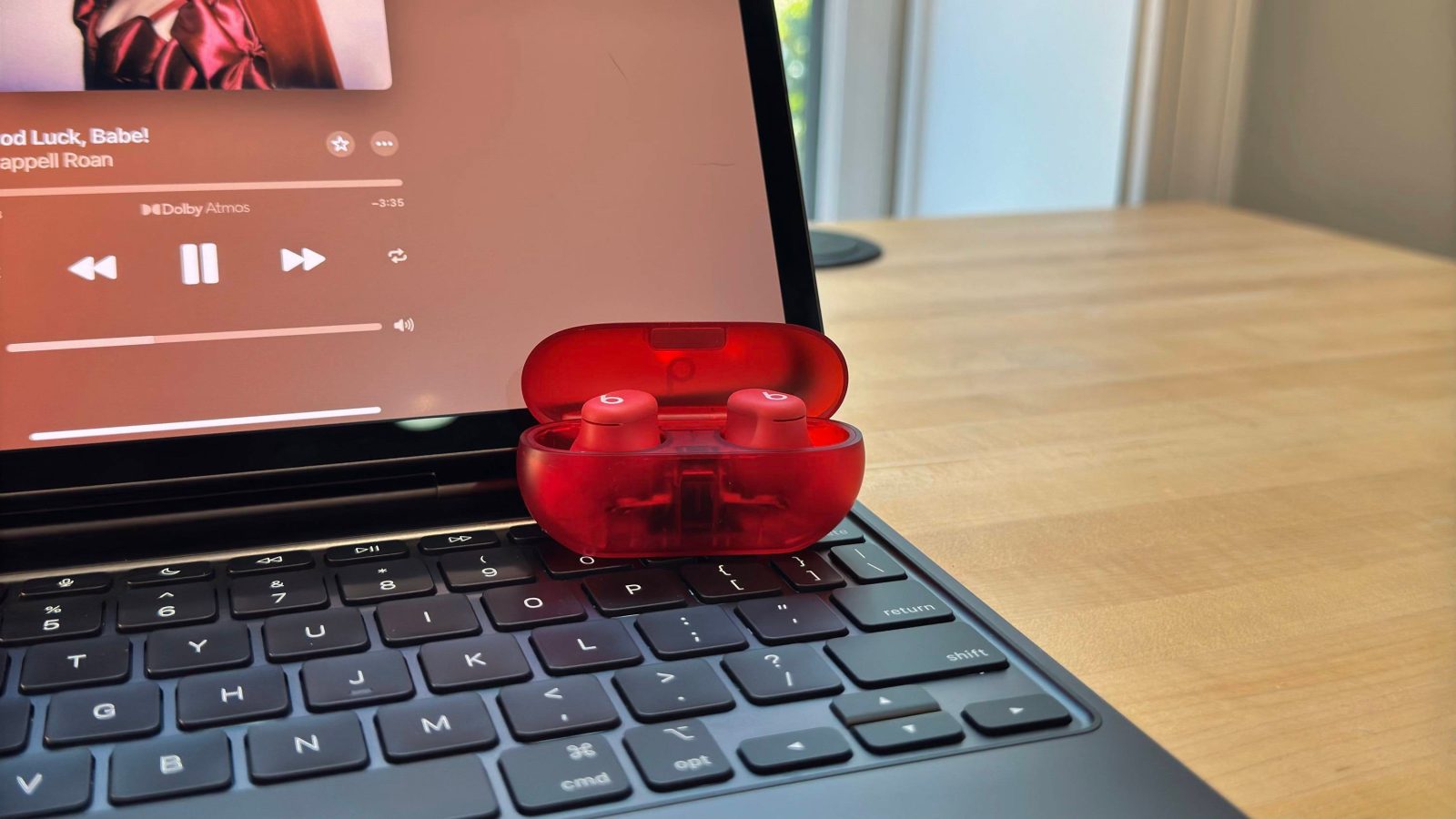
Ever since they were announced in April, I’ve been eager to get my hands on the new Beats Solo Buds. With 18-hour battery life and a $79 price tag, they are one of the most intriguing new products from Beats in a long time.
Beats Solo Buds officially hit store shelves today, and I’ve been using them for the past few days. Let’s dive into some hands-on impressions.
Beats Solo Buds specs
- Chip platform: Beats Proprietary Platform
- Battery life: 18 hours
- Charging port: USB-C
- Native Apple features: One-touch setup, iCloud pairing, iPhone/Apple Watch handoff, Find My support, Audio Sharing
- Native Android features: One-touch pairing, ecosystem pairing, Find My Device support, Audio Switch
- Colors: Matte Black, Storm Gray, Arctic Purple and Transparent Red
- Price: $79.99
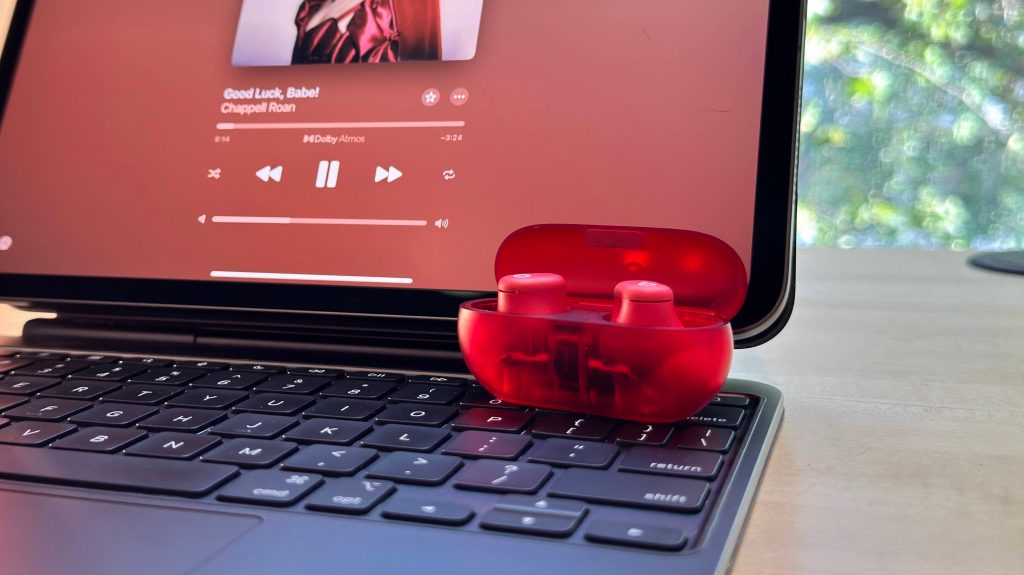
Design
Beats Solo Buds feature a stem-less in-ear design similar to the Beats Studio Buds+. In the box, you’ll find four different sizes of silicone ear tips so you can ensure you’re getting a perfect fit. These are just as comfortable as every other in-ear pair of earbuds on the market, so if you like this style, you’ll like Beats Solo Buds.
Each bud features a button on the end that allows you to control playback and activate Siri:
- Press once to play, pause, or answer a phone call
- Press twice to skip forward
- Press three times to skip back
- Long press to activate voice assistant
The differentiator for Beats Solo buds, however, is their size. The Beats Solo Buds case is significantly smaller than any other pair of Beats or AirPods earbuds on the market. This is primarily due to the fact that there’s no battery in the case (more on that later) and the short and stout stem-less design of the earbuds themselves.
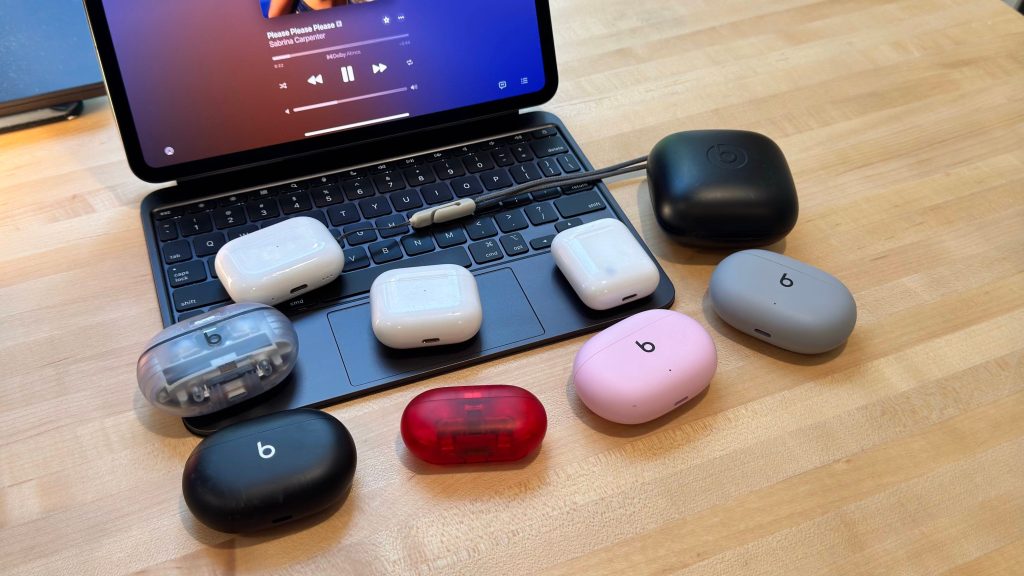
I didn’t expect to notice or benefit from the ultra-small case design of Beats Solo Buds, but I was wrong. There’s something to be said for having Beats Solo Buds in your pocket, but not actually realizing they’re there until you need them.
Oh, and how about this Transparent Red colorway for Beats Solo Buds? It follows in the footsteps of the transparent Beats Studio Buds+ I reviewed last year, and cements the fact that transparent technology is very cool and fun. AirPods, meanwhile, are available in one color.
Battery life
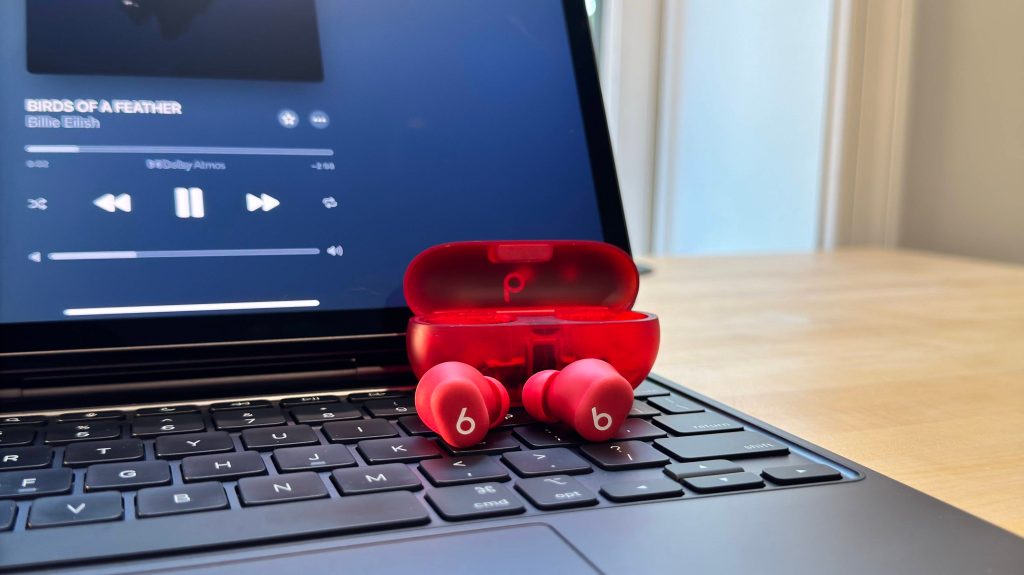
Beats says that Beats Solo Buds offer up to 18 hours of battery life. When I first heard this number, I thought it was too good to be true and asked Beats to confirm, which they happily did.
And to be ultra-clear: that’s 18 hours of battery life from the Beats Solo Buds themselves. There’s no marketing trickery going on here. In fact, the case included with Beats Solo Buds doesn’t feature an integrated battery. Instead, when you want to charge Solo Buds, you place them in the case, then connect the case to a USB-C cable. Beats says a 5-minute charge will get you an hour of battery life.
In my testing, Beats Solo Buds come incredibly close to hitting that 18-hour mark. In my testing, which consisted of listening to a lot of Taylor Swift, Chappell Roan, and Billie Eilish, Beats Solo Buds consistently clocked in between 16 and 17 hours of battery life.
That’s an incredibly impressive number, no matter how you slice it. You can leave the house in the morning and know that you won’t have to worry about charging Beats Solo Buds.
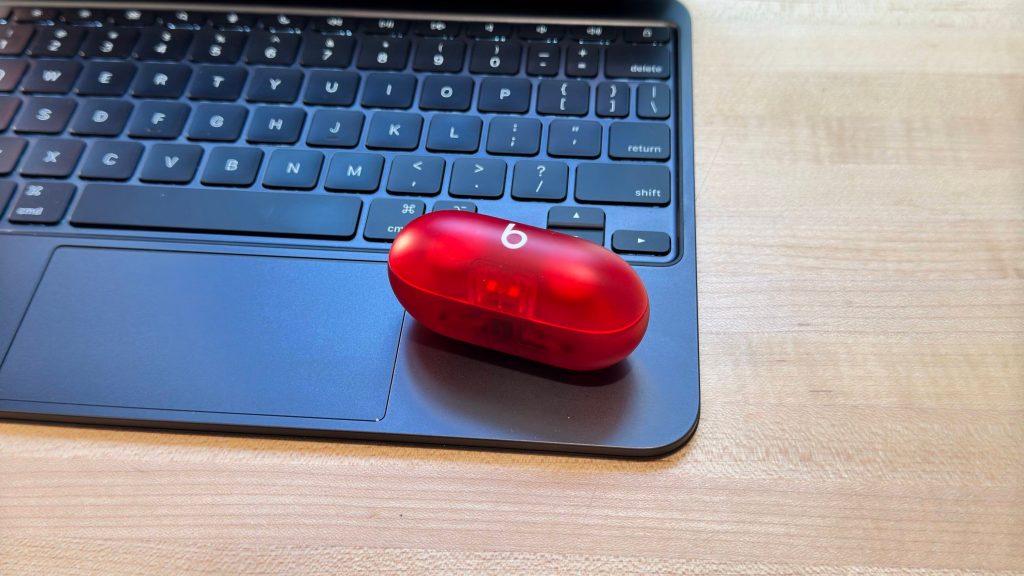
And, this is 18 hours of continuous playback. While AirPods Pro technically advertise longer battery life thanks to the included charging case, the earbuds themselves need to be recharged every 5–6 hours. There are plenty of days, particularly when traveling, where I’d like to go 8+ hours without taking out my earbuds. This is now possible thanks to Beats Solo Buds.
Sound quality
With a $79 price tag and 18 hours of battery life, Beats had to make tradeoffs and compromises somewhere. You won’t find features like Active Noise Cancellation, Transparency Mode, and automatic in-ear detection here.
Automatic in-ear detection is the feature I miss most when using Beats Solo Buds. This means they won’t automatically play and pause content when you take them out or put them in your ears.
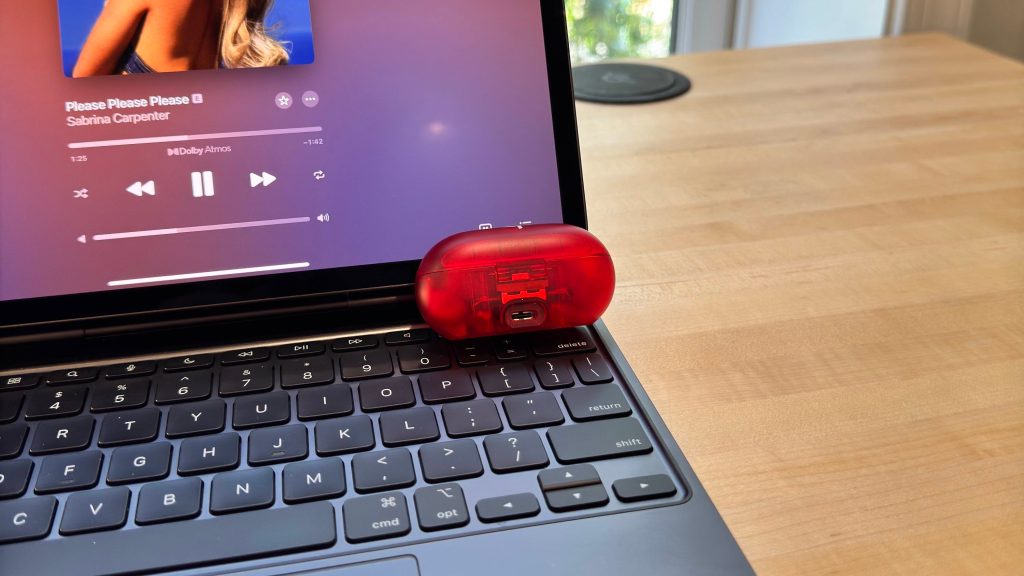
Beats says that each Beats Solo Buds earbud features “dual-layer transducers designed to minimize micro-distortions across the frequency curve, ensuring high-fidelity sound with uncompromising clarity and detail.”
As I always say when I’m reviewing headphones, I’m not an audiophile, and I’m not going to be able to give you a perfect explanation of sound quality in writing. What I will say about Beats Solo Buds, however, is that they sound fine. They’re missing that signature bass-heavy Beats sound profile, but they sound relatively well balanced and consistent.
When you factor in the 18 hours of battery life and $79 price point, they sound really fine. They aren’t going to win any awards for their sound quality, but Beats Solo Buds are more than good enough for the vast majority of people. They are easily the best sub-$100 truly wireless earbuds I’ve tested.
Wrap up
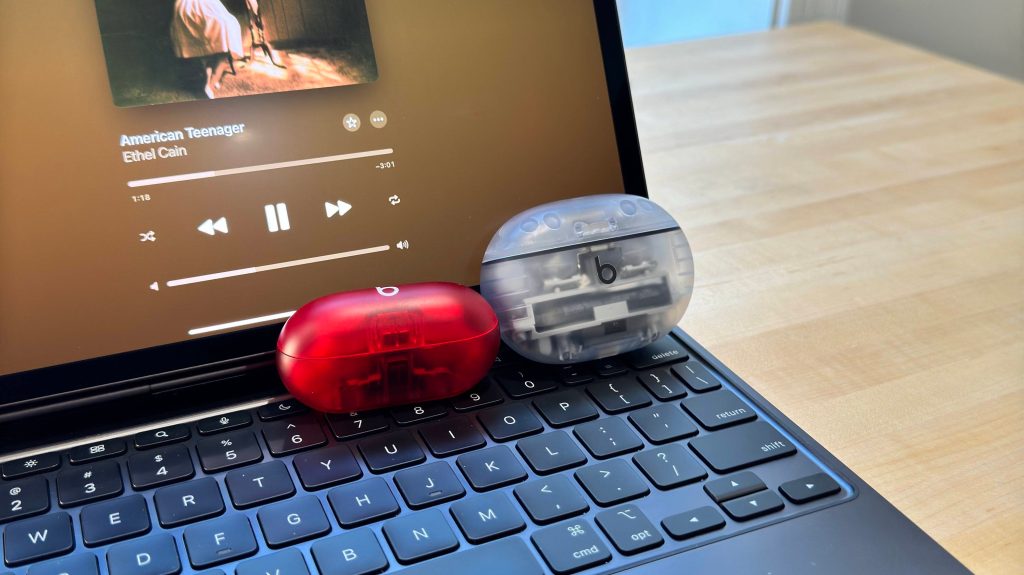
Beats is firing on all cylinders right now (and I don’t think that’s going to change anytime soon). Over the past 13 months, we’ve seen the launch of the Beats Studio Buds+, the Beats Studio Pro, Beats Solo 4, and now the Beats Solo Buds.
While the Studio Buds+, Studio Pro, and Solo 4 were revisions to existing products, the Beats Solo Buds are a completely new product category for Beats – and they hit it out of the park.
- Beats Flex: $69.99 (Full review)
- Beats Solo Buds: $79.99
- AirPods (2nd generation): $129 (Full review)
- Beats Studio Buds+: $169.99 (Full review)
- AirPods (3rd generation): $179 (Full review)
- Beats Fit Pro: $199.99 (Full review)
- AirPods Pro (2nd generation): $249 (Full review)
- Powerbeats Pro: $249.95 (Full review)
Low-cost wireless earbuds are a dime a dozen on Amazon, but Beats Solo Buds set the new standard for the category. For $79 you get the iconic Beats design language, nearly 18 hours of battery life, deep integration with iOS and Android, and an incredibly compact and pocketable design.
What do you think of the current Beats product lineup? How does it compare to AirPods? Let us know down in the comments.
Follow Chance: Threads, Twitter, Instagram, and Mastodon.
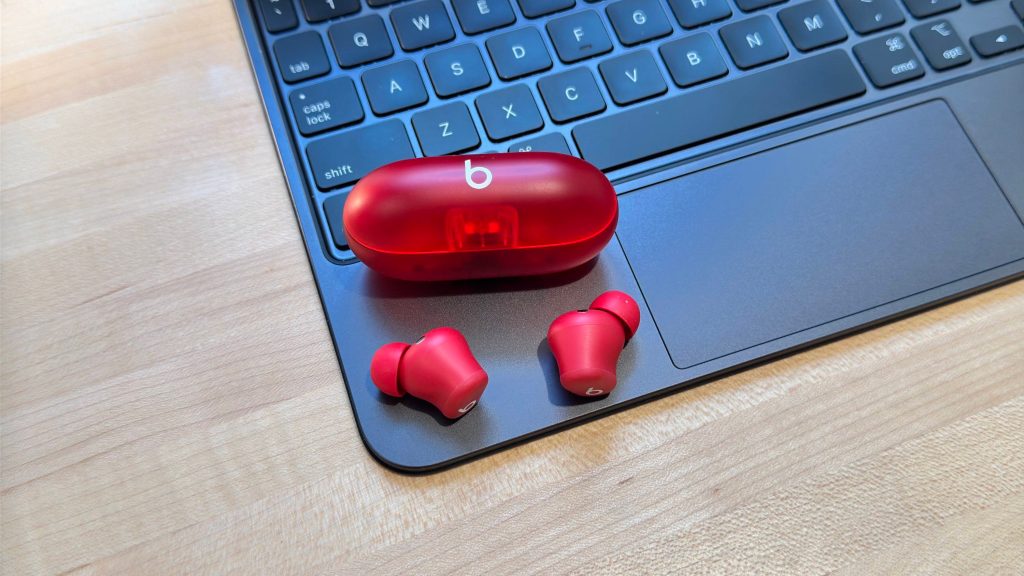
FTC: We use income earning auto affiliate links. More.

 6 months ago
159
6 months ago
159







 English (US) ·
English (US) ·